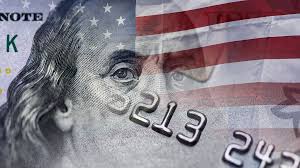U.S. households are carrying a record amount of credit card debt, according to a new Federal Reserve Bank of New York report released Tuesday. The bank said the data indicates financial distress is on the rise, particularly among younger and lower-income Americans.
Total household debt grew by $212 billion, rising to $17.5 trillion in the fourth quarter of 2023, the Fed’s quarterly report on household debt and credit shows.
Credit card balances rose by $50 billion to hit a record $1.13 trillion. Inflation and higher interest rates are contributing to rising credit card debt, resulting in more Americans struggling to pay down their credit card balances, according to Bankrate’s senior industry analyst Ted Rossman.
“We’re seeing more people carrying more debt for longer periods of time,” Rossman said in an emailed statement. “For example, 49% of credit cardholders carry debt from month to month, up from 39% in 2021.”
Most analyses of Americans’ financial health tend to tell a tale of two consumers. On one side are the roughly two-thirds of Americans who own their homes and those who’ve invested in the stock market and done substantially well. They generally had the savings cushion necessary to weather high inflation.
But for the rest of America, things are looking rough.
“You have these noticeable pockets of consumers — mostly middle- and lower-income renters who have not benefited from the wealth effect of higher housing prices and stock prices — who are feeling financial stress and that’s driving up these delinquency levels. They’ve been hit very hard by inflation,” said Warren Kornfeld, a senior vice president at Moody’s.
Credit card delinquencies are surging
Consumers who carry credit card debt are also feeling the impact of higher interest rates, which have been pushed upwards due to the Federal Reserve’s flurry of interest rate hikes. That’s making it more costly to carry a balance on a credit card, with Rossman noting that the average credit card annual percentage rate is at a record 20.74%.
Credit card delinquencies have also soared more than 50% in the past year, with the Fed’s report finding that about 6.4% of all accounts are now 90 days past due, up from 4% at the end of 2022.
Mortgage balances increased by $112 billion to reach $12.25 trillion.
Debt holders are also carrying their debt for longer periods of time, as it compounds, and they struggle to pay it off. Credit card delinquency rates are rising, too.
Other types debt, including auto loan balances, grew too, hitting $1.61 trillion.
Only student loan balances were mostly flat, increasing by $2 billion and standing at $1.6 trillion.

